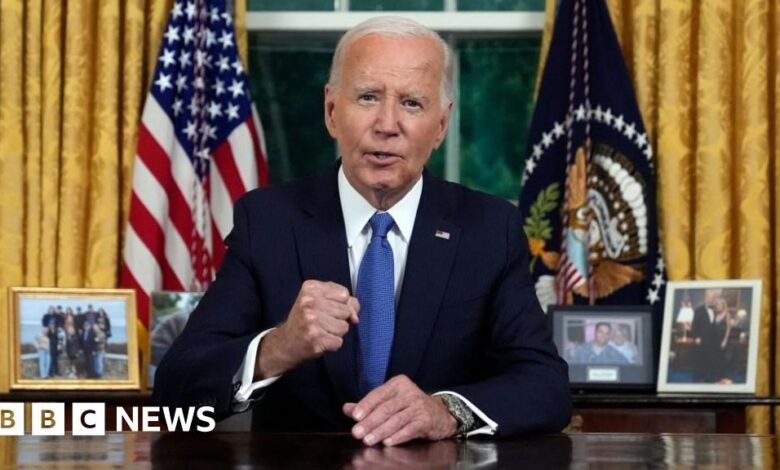Biden dodges harsh truths in first speech since leaving race

This is Joe Biden’s first chance to determine how he will be judged by history.
In a rare televised address from the Oval Office on Wednesday night, his first public comments since abruptly ending his re-election bid on Sunday, he talked about his accomplishments. He talked about his humble origins. He praised the American people. He said the future of American democracy is in their hands.
What he did not do, despite saying he would always be straight with Americans, was give a direct answer to the biggest question of the day.
He did not say why he became the first sitting president to drop his re-election bid, just months before voting begins.
And that’s what history books will be most interested in.
He alluded to it. He skirted around it. But he never addressed it head-on. The American people have to read between the lines.
“In recent weeks, it has become clear to me that I need to unite my party,” Mr. Biden said.
He then reiterated what a growing number of Democrats agree with — that it was time to “pass the torch” to a new generation.
While he said his achievements, which he detailed, merited a second term, he added that “nothing can stand in the way of saving our democracy – and that includes personal ambition”.
Left unsaid was the cold, hard truth that he resigned because it was increasingly clear that he would lose to Donald Trump in November. And that was an outcome that his own party viewed as a disaster.
Trailing in the polls, embarrassed by a poor debate performance and with growing voices in the Democratic Party calling for his resignation, there is no clear path to victory for Biden.
While the president may not say so, his Republican predecessor — and now former rival for the White House — has no such concerns.
At a rally in Charlotte, North Carolina, hours before his speech, Donald Trump said Mr Biden dropped out because he was losing badly.
He then went on to attack Kamala Harris, the party’s presumptive nominee, declaring her a “crazy leftist” and “the radical driving force behind all of Biden’s disasters.”
Republican groups have flooded the airwaves in key battleground states in an effort to define Harris on their terms, not hers. Trump’s campaign is expected to outspend Democrats 25-to-1 in the coming month, according to an Associated Press analysis.
One ad claimed that Ms Harris had helped cover up the president’s “obvious mental decline”.
Mr Biden’s speech was a nationally televised prime-time opportunity to counter criticism of his vice president and address concerns about his ability to continue to serve as president.
It was an opportunity he often missed.
Near the end of his speech, the president spoke about his running mate. He said Ms Harris was “experienced, tough, capable” and “an incredible partner for me and a leader for our country.”
Those were strong words, but not much else. He spent more time discussing Benjamin Franklin than his vice president — the man he endorsed on Sunday, and the man who will be the most important torchbearer of his legacy in the months to come.
With little protection from the president, Ms Harris and her team will have to decide whether and how to respond to fierce Republican attacks in the coming days.
Biden may have another chance to praise his former vice president at the Democratic convention in Chicago next month, but it’s a delicate time for the presumptive nominee, as her campaign has just begun and Americans are still learning about her.
The president may be uncomfortable getting too political in what could be his last speech in the Oval Office. But if he’s concerned about his legacy, Harris’s success or failure will matter more than anything else he does from now on.
This will determine whether history judges him as a man who made the ultimate sacrifice or as someone who put his party in danger by selfishly holding on to power for too long.




